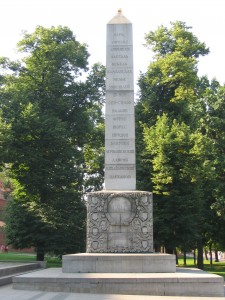 Next year is the quincentennial of the publication of Thomas More’s Utopia, and celebrations of the book and its author have already begun. More, of course, is a darling of Western culture and politics. He was canonized and is considered the patron saint of politicians and statesmen. Essayist C.K. Chesterton said that More may be “the greatest historical character in English history.”
Next year is the quincentennial of the publication of Thomas More’s Utopia, and celebrations of the book and its author have already begun. More, of course, is a darling of Western culture and politics. He was canonized and is considered the patron saint of politicians and statesmen. Essayist C.K. Chesterton said that More may be “the greatest historical character in English history.”
It therefore comes as a bit of a surprise to learn that More also has a following on the political left. None other than Marx and Engels praised More’s thinking, and Lenin honored him by listing his name on a monument erected in Moscow’s Aleksandrovsky Gardens.
More’s description of an ideal society in Utopia is what leads to the leftist lionizing. His society has no private property, state ownership of the means of production, and extensive welfare programs for the poor and elderly. Because of these public policies, More seems to some to be a “proto-Communist.”
None of these policies are even remotely possible in the contemporary U.S., and the collapse of actual Communist regimes of the late-twentieth century is well-documented. However, More deserves credit for reflecting on what type of socioeconomic structure might produce what type of consciousness. More thought that the population of his utopian society would avoid alienation and adopt a genuinely social worldview rather than a greedy, self-interested individualism.
More was a dreamer. Yet his variety of dialectical materialism remains appealing 500 years after he teased it out – in Latin no less!

For a contrary interpretation, see “Sic Est in Republica: Utopian Ideology and the Misreading of Thomas More”, by R. V. Young, ‘Humanitas’, Volume XXVI, Nos. 1&2, 2013, p. 75
“In fact, the book Utopia provides the earliest antidote to utopian ideology, which it disparages as an analogue to generic confusion and a fault of decorum, and which it subtly ridicules by the ironic deployment of stylistic variation. St. Thomas More’s Utopia is perhaps the first dystopia in the Western literary tradition.” [footnote omitted] p. 76
http://www.nhinet.org/young26-1.pdf